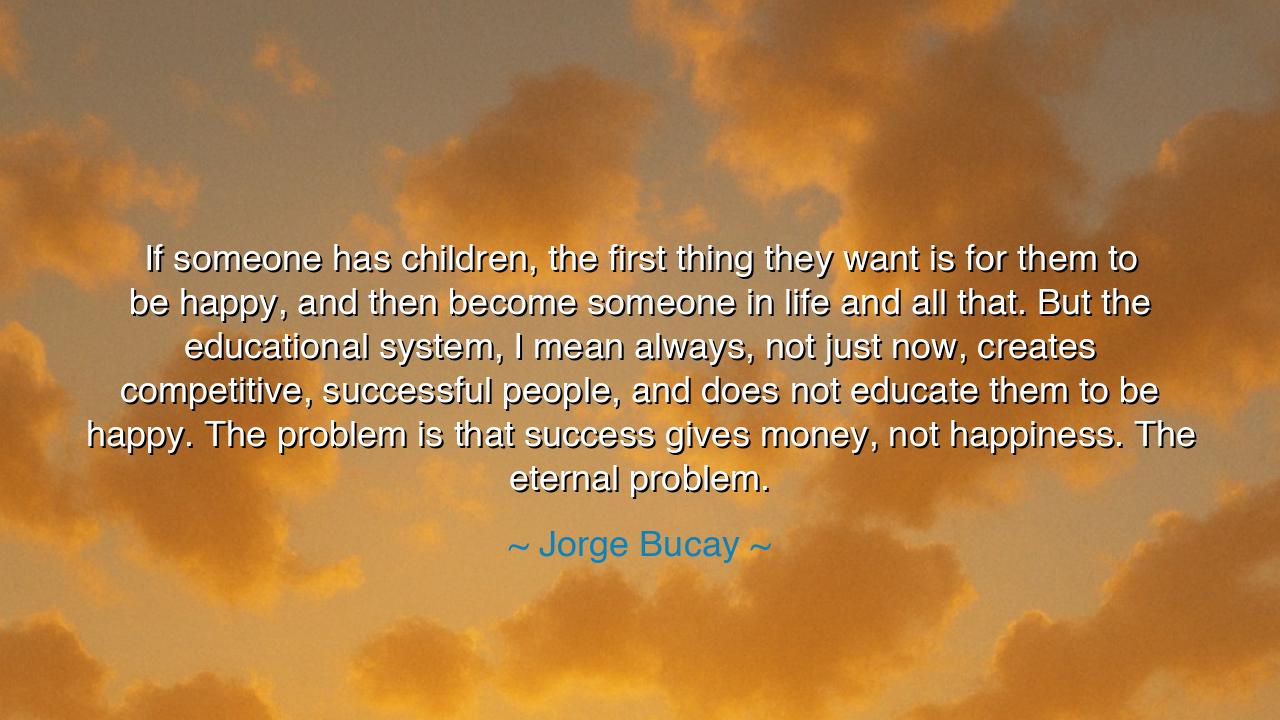
If someone has children, the first thing they want is for them to
If someone has children, the first thing they want is for them to be happy, and then become someone in life and all that. But the educational system, I mean always, not just now, creates competitive, successful people, and does not educate them to be happy. The problem is that success gives money, not happiness. The eternal problem.






The wise Argentine writer and psychotherapist Jorge Bucay, known for his deep reflections on the human soul, once said: “If someone has children, the first thing they want is for them to be happy, and then become someone in life and all that. But the educational system, I mean always, not just now, creates competitive, successful people, and does not educate them to be happy. The problem is that success gives money, not happiness. The eternal problem.” In these words, Bucay casts light upon a wound that runs deep within modern civilization—the rift between success and happiness, between what society teaches and what the soul truly needs. His insight calls us to remember that the ultimate aim of life is not achievement, but fulfillment; not to “be someone,” but to be whole.
The meaning of this quote rests upon a timeless paradox. From the moment a child is born, every parent whispers the same wish: May they be happy. Yet, almost as soon as the child begins to grow, that wish is buried beneath the weight of ambition, grades, and comparisons. The world begins to whisper a different message: To be happy, you must first be successful. Thus, the innocent joy of being alive is slowly replaced by the restless chase for approval, wealth, and status. Bucay’s lament is not against ambition itself, but against a system that confuses achievement with contentment—a system that trains the mind to compete but forgets to nurture the heart to rejoice.
The origin of this wisdom lies in Bucay’s lifelong work as a healer of minds. As a therapist and philosopher, he listened to countless souls who, despite having achieved every outward sign of success—wealth, prestige, comfort—found themselves empty, anxious, and lost. Through their stories, he saw that education, as it has long been structured, serves the world of commerce, not the world of the spirit. It produces brilliant professionals but uncertain humans; capable thinkers but disconnected hearts. He understood that a society which measures worth only in economic terms will forever be rich in things and poor in meaning. His words, then, are not a condemnation but a call—to rebuild education so that it teaches not only knowledge, but wisdom, not only how to earn a living, but how to live well.
History, too, bears witness to this eternal tension. Consider the story of Leo Tolstoy, the great Russian novelist. At the height of his fame and wealth, he fell into a deep spiritual despair. The applause of the world, the riches of his labor—none of it could fill the hollow ache within. In his Confession, he wrote that he had everything that others envied, yet he could not find a reason to live. It was only when he turned toward simplicity, compassion, and the pursuit of inner truth that he rediscovered joy. His transformation mirrors Bucay’s insight: success gives money, not happiness. True happiness arises not from what we have, but from what we understand about ourselves and the meaning of our existence.
There is a quiet tragedy in Bucay’s observation about the educational system—for it reflects not only schools, but entire societies. From childhood, we are taught to compete rather than cooperate, to outperform rather than understand. We are told that success is measured by the applause of others, not by the peace within. But this endless race leaves us weary, and when we finally arrive at the summit, we find the view barren. What the world forgot to teach us is that happiness is not a prize at the end of the road; it is the path itself. It is found in kindness, in gratitude, in creativity, in the freedom to be oneself without comparison or fear.
To live wisely, as Bucay would have us live, we must unlearn what the world has taught us about happiness. We must remember that to be happy is not to have everything, but to need less. We must raise our children not merely to be achievers, but to be aware—to see beauty in small things, to rest in stillness, to value love above recognition. Let education be not only a training of the mind, but a cultivation of the soul. Let us teach our children that to “be someone” means to be authentic, not famous; to live in truth, not in comparison.
The lesson of Bucay’s words, therefore, is both simple and revolutionary: seek happiness, not as a goal, but as a way of living. Do not chase success for its own sake, for it will fade like mist in the sun. Instead, build your life upon peace, compassion, and purpose. Spend time in reflection; measure your worth not by wealth but by wisdom, not by applause but by inner calm. And when you find even a moment of serenity in your day, as Bucay says, count yourself very lucky—for that moment, however brief, is the purest form of success a human being can know.
So let these words be carried forward, as a truth for all generations: Happiness is the true education, and peace the highest achievement. The world may offer money to the successful, but it gives peace only to the wise. Let us teach our children to be both—clever in mind, but gentle in heart; skillful in work, but radiant in joy. For as Jorge Bucay reminds us, the eternal problem of humanity is not that we desire happiness—it is that we have forgotten where it truly resides.






AAdministratorAdministrator
Welcome, honored guests. Please leave a comment, we will respond soon